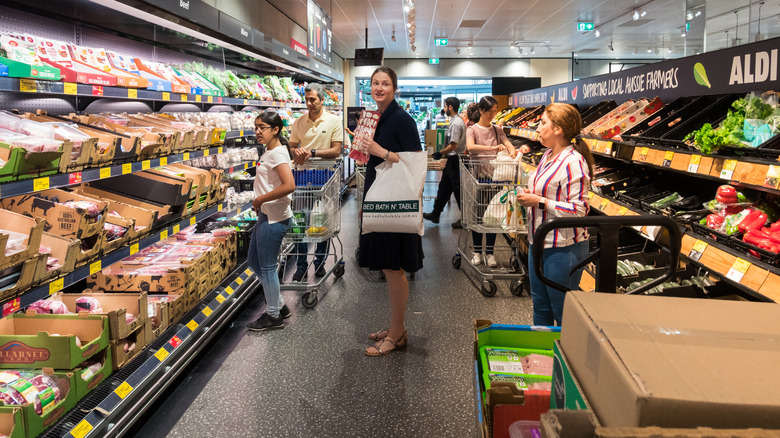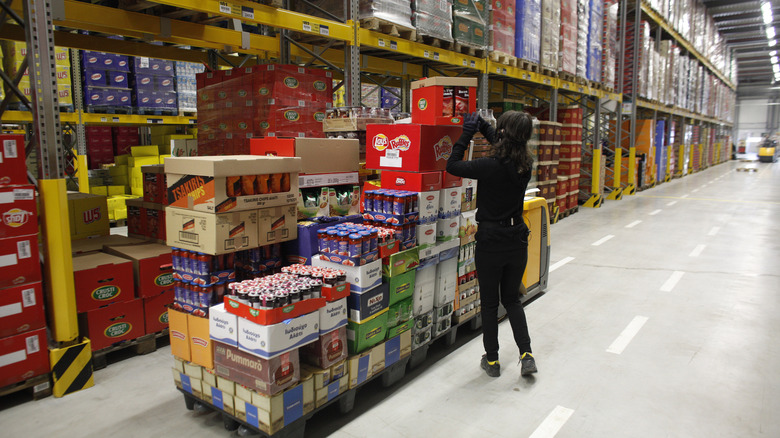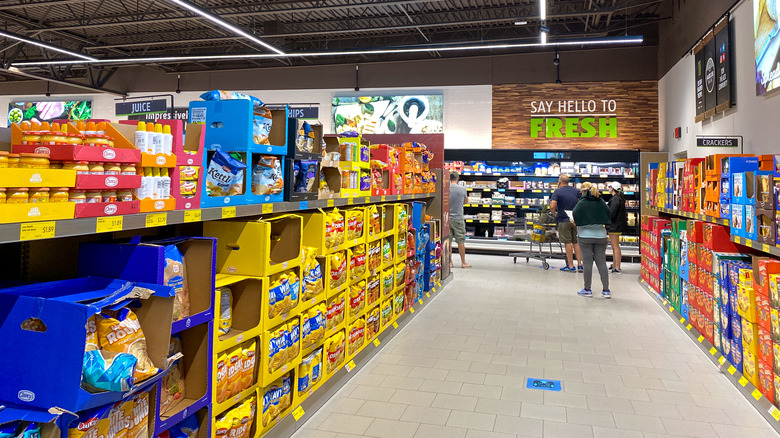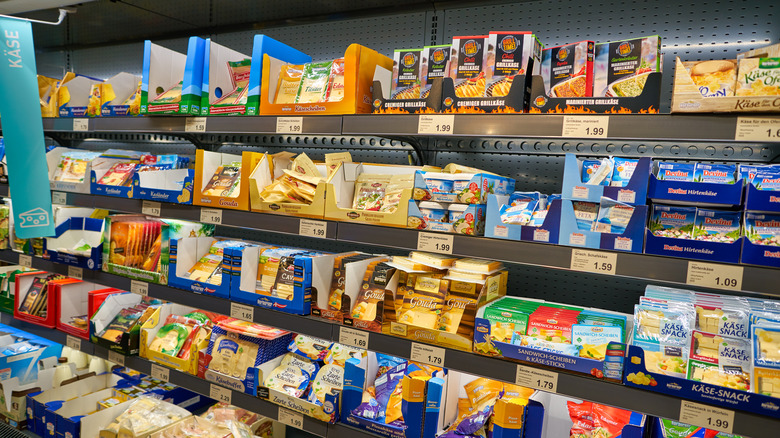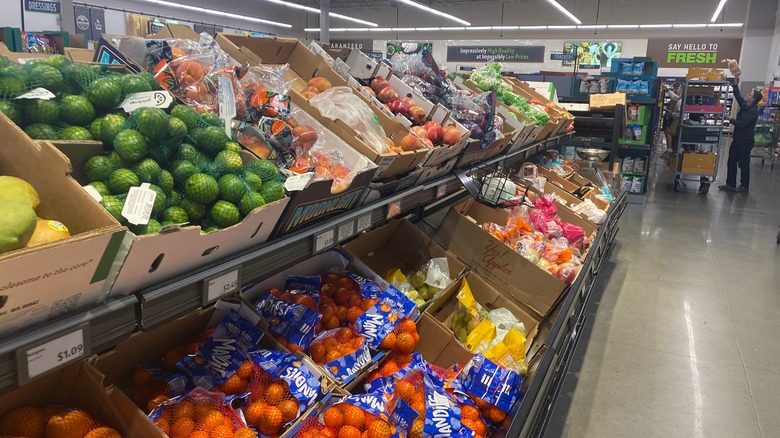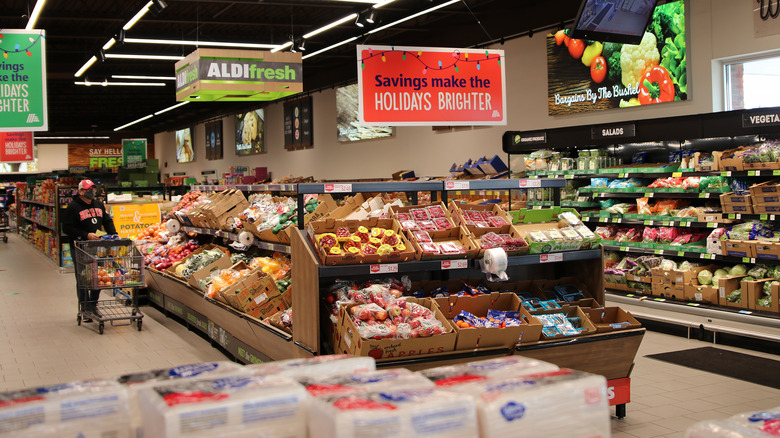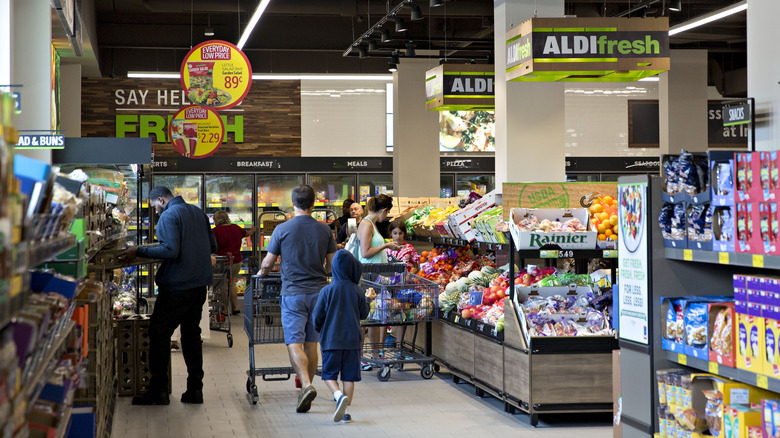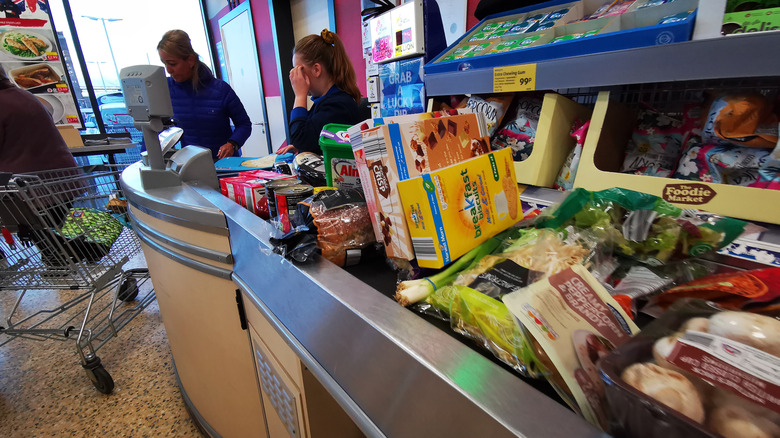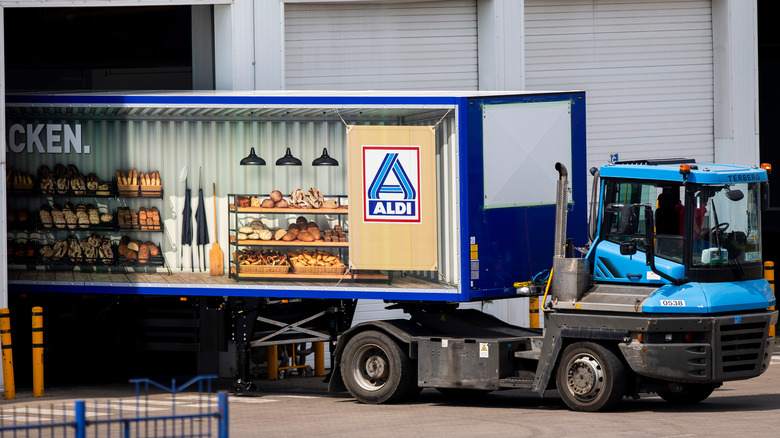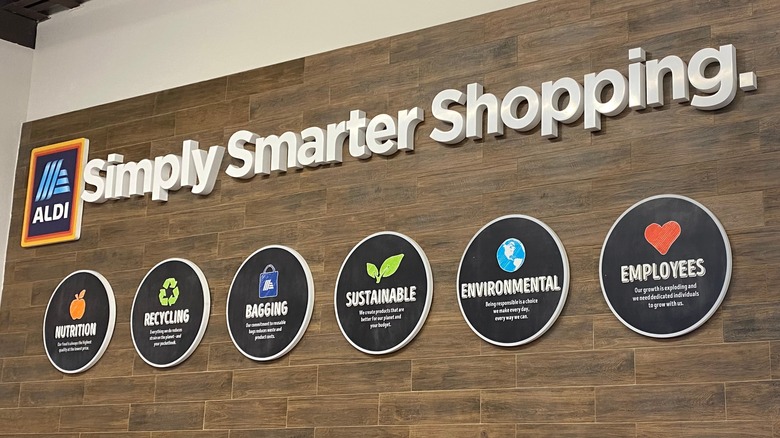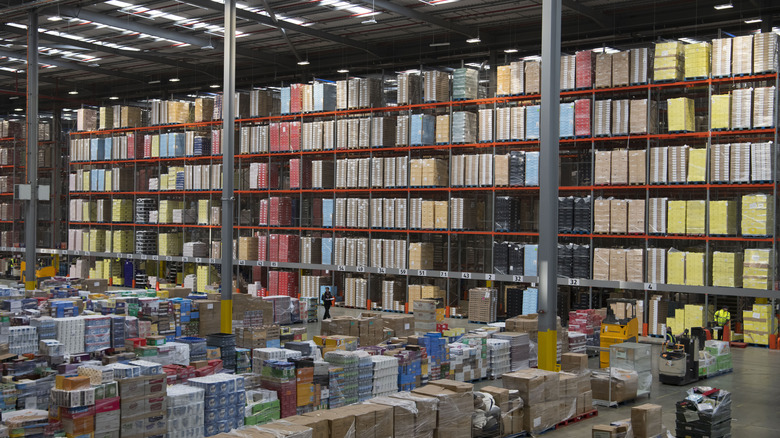Secrets Behind Aldi's Innovative Supply Chain
Running a grocery store in America is challenging due to the market dominance of industry giants like Walmart and Whole Foods. Razor-thin profit margins and the evolving dynamics of home delivery and online shopping add another layer of complexity. But despite the challenges, Aldi has cracked the code to success with a stellar supply chain model — growing aggressively in the U.S. and reshaping the entire industry.
Amid its expansion to around 2,400 stores across 35 states, Aldi has changed the supermarket game. The combination of dangling rock-bottom prices and streamlining operations has tipped the scales in its favor. It all starts with the shopping carts, which the grocery store rents to shoppers for a 25-cent deposit to help curb the issue of abandoned carts. Aldi regulars also buy paper and plastic bags and even bag their own groceries, saving money on labor costs.
Even with these minor inconveniences, the fast-growing discount chain still boasts a legion of fawning fans — so how does Aldi keep customers coming for more? It turns out the German discounter got innovative with its supply chain to stand atop the food chain.
1. Robust inventory management
Cleverly driving prices down with a limited inventory and simple product range is one of Aldi's best-kept secrets. While other regular stores pile their goods in hundreds and thousands of stock-keeping units, Aldi holds onto around 1,400 of the fastest-moving grocery items — keeping its supply chain simple and operational costs lower. Stocking only staple items keeps the store's purchasing and distribution processes lean and efficient. It's simple; Aldi buys stock in bulk at lower costs and passes the savings to its customers.
The real kicker is Aldi's inventory model, the just-in-time delivery system. This innovative system ensures fresh products are always available when needed, reducing waste and freeing up capital often tied up in stock. Cutting these unnecessary expenses helps Aldi respond quickly to market changes and customer demands, offering its customers high-quality products at incredibly low prices (a premise it has maintained for nearly 20 years). Aldi eventually gains a massive competitive edge as a popular shopping destination for budget-conscious shoppers who barely want to sacrifice quality for affordability.
2. Simple store design
When you enter an Aldi store, you'll immediately notice something different. It bypasses tradition with five or more super-wide aisles. Regular supermarkets have smaller aisles, limiting shoppers' movements. Aldi's simple store design and layout is a seventh heaven for time-strapped shoppers who want to navigate and sift through products easily. By keeping stores and warehouse designs uniform across all locations, Aldi can operate its supply chain more effectively because its layouts are predictable and familiar to regular shoppers.
The brutally efficient grocery store avoids unnecessary expenses, too, such as fancy decorations or displays. Instead, products are placed in their original boxes on bare shelves with easy-to-read, well-displayed prices. The simple setup also impacts Aldi's commitment to sustainability. The company uses smart lighting solutions to save energy and reduce costs. Some of its stores even boast glass roofs that allow natural light to enter, reducing the need for artificial lighting.
3. Cost-cutting strategies
Cost-reducing tricks help the no-frills grocery chain efficiently offer some of the lowest prices in the market. Aldi lowers every cent on its products without compromising quality. Its operating costs are estimated to be half that of other traditional retailers, and the company operates on low-profit margins with a smaller workforce than other less expensive grocery chains. The store's unique model of packaging items in similar containers as brand-name alternatives has also contributed majorly to its success.
For example, there's no glaring difference between General Mills' Honey Nut Cheerios and Aldi's Honey Nut Crispy Oats — their boxes all bear the same orange shade. The same goes for prices; depending on the location, Aldi's Millville Toaster Tarts retail at $1.79 a dozen, while strikingly similar Kellogg Pop-Tarts costs $3.79 a dozen. The fonts on the packages are almost identical, too. Although cheeky, these nifty secrets have helped Aldi keep its supply chain operating and maintenance costs low, offering even lower prices.
4. Offers fresh and local produce
The no-frills discounter replenishes its shelves daily with locally-grown organic produce. By obtaining top-quality vegetables and fruits from local growers throughout the U.S., Aldi delivers its customers the freshest produce possible and saves on transportation costs — passing the savings to its customers. Prioritizing responsible sourcing practices helps the bare-bones grocery chain to lower its social impact of production, boosting its supply chain efficiency. It also draws even more health-conscious customers to Aldi stores who are ready to pay a high value for fresh and locally sourced produce.
Beyond the culinary delight of fresh organic produce, Aldi also provides certified gluten-free foods for customers who prefer gluten-free options for health reasons. The products vary from tempting frozen sides, brownie mixes, and rice crisps to tasty pasta and bread, encouraging sustainable and ethical suppliers to innovate with Aldi's brand. Establishing such dynamic partnerships improves the quality of Aldi's offerings, enhancing its reputation while reducing product prices.
5. Influx of new and seasonal items
Every week, Aldi fills its shelves with dozens of new, low-priced products. Depending on the store, you'll discover fresh batches of seasonal finds, mainstays, and Aldi Finds products at amazingly low prices. One week, you'll spot award-winning rosé wine, followed by Halo Top ice cream dupes, and maybe some wine and cheese advent calendars soon after — you never know what the next limited-time product will be.
Aldi introduces fresh batches of seasonal finds every week to experiment with new products and markets without binding itself to long-term contracts with suppliers. It's the company's innovative way of eliminating storage and inventory costs. Holding less stock enables the German grocery chain to minimize unnecessary waste and risk effectively, streamlining its operational efficiency, supply chain, and flexibility over time.
Aldi shoppers eager to welcome the festive season early into their homes will probably splurge on new seasonal items to prepare for a cozy month. Behind the scenes, the discounter streamlines its processes by closely tracking the number of unsold items in the Aldi Finds section to free up more cash for other needs.
6. Encourages green habits
Encouraging customers to go green is another secret behind Aldi's rock-bottom prices and stellar operational efficiency. The German discounter urges shoppers to bring reusable shopping bags to the store or buy Aldi's reusable tote bags. Actively shunning plastic packaging fosters a culture of eco-friendly recycling and highlights Aldi's private-label packaging. This move also reinforces the company's steadfast commitment to reduce all plastic packaging on its products in the U.S. by at least 15% in 2025.
Adopting a sustainable ethos trims Aldi's packaging costs, fees, and the plastic waste footprint of all its exclusive products. This green approach matches Aldi's environmental goals and improves its supply chain efficiency and operational effectiveness. Aldi also offers a smart shopping cart rental system as a clever solution to save money on hiring additional staff to round up stray shopping carts in the parking lot.
This ingenious system also prevents injuries, accidents, and chaos in the parking lot by motivating shoppers to safely return their shopping carts to the cart bank. Actively encouraging Aldi regulars to go green and respect the store's environment is a subtle yet creative cost-saving measure that enables the no-frills grocery chain to offer its customers even more affordable groceries.
7. Best return policies
Aldi values and cares about its customers and product quality; the "Twice as Nice" return policy displayed prominently on its website proves this assertion. It ensures that should a product fall short of your expectations; you can return it to your local Aldi grocery store and receive a full refund and replacement. This remarkably generous policy makes returning and replacing products a seamless experience, particularly for dissatisfied shoppers looking for better quality.
Besides boosting customer satisfaction, the double-guarantee return policy is also crucial to Aldi's supply chain model because it creates an effective feedback loop between its suppliers and customers. Communicating customers' feedback to suppliers helps the grocery store resolve any issues or gaps in the production process, suitably lowering the likelihood and risk of future complaints or product recalls.
The discount store also employs cutting-edge analytic tools to understand its customers' behavior. Using video tracking and heat mapping, Aldi can see which store areas attract the most attention and how long customers spend in each section. On the one hand, Aldi offers a generous refund policy to build customer trust; on the other hand, it uses data to improve its shopping experience and supply chain efficiency. It's a smart way to combine customer satisfaction and operational excellence.
8. Online delivery options
Despite being a relatively new initiative, Aldi's online delivery option presents another novel and smart way to improve its supply chain's efficiency. The process is simple: Customers order groceries online, then the Aldi team picks the items from the shelves, packs them up, and delivers them to customers' doorsteps via Instacart the same day.
Using Instacart services helps the discount store bypass the need to invest heavily in an extensive delivery network and e-commerce infrastructure. Therefore, it drastically reduces the need for additional labor, inventory, and warehouse space. This cost-efficient approach allows Aldi to dip its product prices to new lows while maintaining quality, benefiting its customers and the company entirely.
Moreover, Aldi immensely benefits by attracting and retaining hordes of new and existing online shoppers thanks to Instacart's appealing offers and flexible pricing. The online delivery option is one of Aldi's trump cards, which helps it maintain unbeatable prices and a highly efficient supply chain.
9. Direct delivery from suppliers
The fact that Aldi has forged a close and collaborative relationship with its suppliers strengthens its control over its lean and agile supply chain model. Fueled by mutual trust and respect, Aldi suppliers ship products directly to distribution centers or warehouses to create efficiencies at every level, which grants the no-frills German grocery chain a competitive edge in negotiating better prices and quality. Aldi simply holds all the cards in maintaining its low prices and high customer satisfaction, earning the loyalty and trust of its customers.
Using a lean working model also eliminates Aldi's need for intermediaries who, as we know, create unnecessary complexities in the supply chain and incur extra costs and delays to the delivery of products. Ultimately, this triggers conflicting interests, leading to even more costly inefficiencies and mistrust.
In addition to carefully selecting its suppliers, Aldi verifies that they're fully compliant with its social and environmental standards under the Social Monitoring Programme (SMP), which aims to improve working conditions at all sites making Aldi products. Healthy relationships with suppliers empower Aldi to continuously enhance its supply chain and offer customers products at much lower prices.
10. Superior digital solutions
Aldi is the poster child for everything cheap. Still, not everyone knows that superior digital solutions contribute to reducing the bare-bones grocery store's prices and enhancing its supply chain efficiency. Aldi uses a special digital program, Celonis, to do tasks better and faster, such as analyzing the company's 2 billion-plus transactions. The real-time process mining program also helps keep track of everything the German discounter does and how it does it daily.
Since Aldi collaborates with many suppliers to execute processes fast, things may not always go as expected. For example, the no-frills store may order too little or too much of something, orders may take ages, or there may even be costly and serious mistakes. Celonis remedies these problems by identifying when and where they happened. It analyzes what Aldi and its partners do daily, then advises the German discounter on enhancing efficiency and operational effectiveness.
For example, Celonis may advise Aldi to order more or less gluten-free bagels or deliver the mini muffin blueberry packages sooner or later. By employing superior digital solutions such as Celonis, Aldi not only enhances customer satisfaction and reduces costs, but also optimizes its supply chain efficiency to higher levels.
11. Store expansion and remodeling
Aldi also bolsters its supply chain efficiency by systematically expanding and remodeling its stores and distribution centers. This intentional approach enhances quality control and strengthens its bargaining power while streamlining distribution processes. In early 2023, the bare-bones German discount store completed its 26th regional distribution center, catering to nearly 100 stores throughout the Gulf Coast region. This colossal facility adheres rigorously to Aldi's signature user-centric design. Also, it integrates features that align with the company's sustainability efforts, including an eco-friendly refrigeration system, LED and natural lighting utilization, metal panel insulations, and integrated solar panels to significantly reduce energy costs.
Aldi recently unveiled another expansion deal, which will be finalized at the start of 2024, entailing the acquisition of all 400 stores from Harveys and Winn-Dixie supermarkets. You can confidently wager that Aldi will revamp the newly-acquired supermarkets with the hallmark minimalistic store design features reminiscent of all its discount stores — an uncluttered layout, super-wide aisles, ample spaces, efficient and minimal lighting, and products prominently displayed in their original shipping boxes. This remodeling and rapid expansion enable Aldi to reach a broader customer base and strengthen its foothold in the fiercely competitive grocery industry, while delivering top-quality products at unbeatable prices to its legion of customers.
